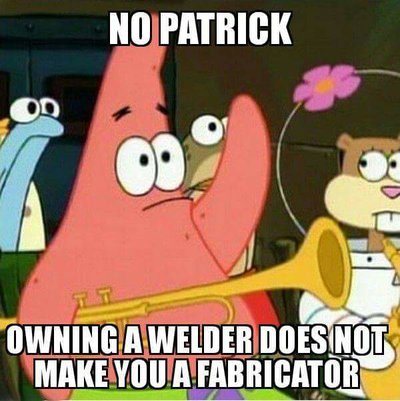Richard.
Member
- Messages
- 18,335
- Location
- Cambridgeshire
The skill set required really depends on so much.
Lots of people call themselves welders and I disagree with them 9/10.
You cannot be a “welder” unless you hold a recognised qualification saying you are a welder. Some might disagree with this and claim to be welders but the way I see it your not a sparky without the quals, your not a Dr without the quals and welding should be no different. I’m not a welder anymore because any codes I’ve held in the past are long past the exp date.
Now you can use a welder without codes and do a full time job manufacturing stuff and in this case your a fabricator. Being a fabricator (proper fabrication not jig slamming) is a very skilful job. Put The welding aside here as it’s the easiest bit. you need to know about bend angles, rolling, distortion, working out cutting lengths, where to and how to add strength and judge stress. This is a list I could write forever.
Maths and physics are very handy in real proper fabrication. Problem now is most of it is written up on computers now which although makes life easy, like everything the true skills of using formula die with it. I used to build parts for automated welding machines a good while ago. The cooling tables, hoppers and extraction points were all fabbed with squares to rounds, lobster backs, pipe work and often they were worked out with pen and card and some trial and error.
A skilled positional welder can have a different skill set to a fabricator. Maths and physics are not nearly as important but skills like judgement of a pool and understanding a little about defects, why they happen is pretty crucial.
Knowledge of how to properly put in a root without lacking fusion and how to properly repair a flaw.
I believe a proper welder should have some understanding of visual inspection in the same respect I believe a driver should be able to change a wheel.
People get welders and fabricators mixed up sometimes but they are very different skills.
Lots of people call themselves welders and I disagree with them 9/10.
You cannot be a “welder” unless you hold a recognised qualification saying you are a welder. Some might disagree with this and claim to be welders but the way I see it your not a sparky without the quals, your not a Dr without the quals and welding should be no different. I’m not a welder anymore because any codes I’ve held in the past are long past the exp date.
Now you can use a welder without codes and do a full time job manufacturing stuff and in this case your a fabricator. Being a fabricator (proper fabrication not jig slamming) is a very skilful job. Put The welding aside here as it’s the easiest bit. you need to know about bend angles, rolling, distortion, working out cutting lengths, where to and how to add strength and judge stress. This is a list I could write forever.
Maths and physics are very handy in real proper fabrication. Problem now is most of it is written up on computers now which although makes life easy, like everything the true skills of using formula die with it. I used to build parts for automated welding machines a good while ago. The cooling tables, hoppers and extraction points were all fabbed with squares to rounds, lobster backs, pipe work and often they were worked out with pen and card and some trial and error.
A skilled positional welder can have a different skill set to a fabricator. Maths and physics are not nearly as important but skills like judgement of a pool and understanding a little about defects, why they happen is pretty crucial.
Knowledge of how to properly put in a root without lacking fusion and how to properly repair a flaw.
I believe a proper welder should have some understanding of visual inspection in the same respect I believe a driver should be able to change a wheel.
People get welders and fabricators mixed up sometimes but they are very different skills.




